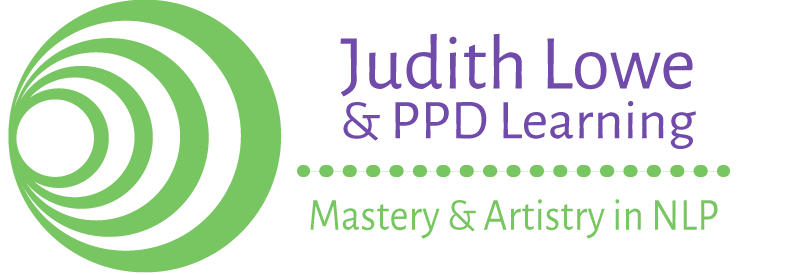Choosing an Neuro Linguistic Programming (NLP) Practitioner Training Programme
A Brief Guide by Judith Lowe
Joining a training course that has integrity and lasting value for you;
1. Train with an expert
Find an NLP trainer who has truly acquired the skills themselves. They should demonstrate NLP Mastery in their behaviour – i.e. ‘walk their talk’ and be approachable and genuine as human beings.
Training NLP requires a multi-level, wide-ranging skill set and it takes many years – not days, weeks or months - to acquire a level of expertise to teach to varied learning styles and to manage the dynamic and lively nature of an NLP course.
The values and experience of the trainer will determine the quality of the training you get.
It’s essential that your trainer has taught and used NLP in a variety of professional contexts – so they
understand both the personal and the business/ career challenges people are facing, and have
themselves road-tested everything they teach you in the real world.
Despite various Boards and Associations there is no globally agreed accreditation for an NLP trainer. Neither is there a standardised approach to the training itself.
However, some teachers are genuinely more gifted, visionary, experienced and hard-working than others – and this will make a difference to the standards they set for your learning and achievement.
Over the years, the field of NLP has produced many truly wonderful teachers. There have also been people who use it, unfortunately, as a ‘quick fix’ or ‘get-rich-quick’ set of tricks that you do to others.
So, do your research and make sure you are being taught NLP by someone who really knows their stuff, has flair and good humour, and who cares about you and your longer term success with NLP.
2. Learn in a training context with real experiences, feedback and coaching.
NLP skills are subtle and inter-active, responsive to 'live' conditions - there's only so much you can learn from books and CDs.
Like learning to play a musical instrument or learning a sport - unless you actively do it yourself, it remains purely cognitive, abstract and un-integrated.
To get NLP 'in the muscle' find a training which encourages you to engage fully with activities, exercises, discussions etc. Get involved, learn together in a diverse peer group and develop your skills experientially.
Learn in a context where you can get quality feedback, personal coaching and you can have your questions answered.
It’s also preferable to join a module-based course so that your skills can be tested and refined in the real world alongside the programme.
The tools and techniques in NLP are powerful and understanding them intellectually is important to help you acquire some of the principles and the patterning.
Working with mastery in NLP also requires highly sophisticated social and emotional skills. You co-create in the living moment a profoundly collaborative and unique ‘field’ of relationship, as you support someone with NLP tools to make their desired changes.
Look for a course in which there is a strong emphasis on the dynamic, relational, somatic and unconscious aspects of learning, and on more generative approaches to change in living systems.
Being elegant, graceful and systemic in your work takes time and practice to acquire – it comes from deeper knowledge and experience, good teaching, coaching and feedback.
3. Choose a more substantial, full training if you want to use NLP successfully.
The label of 'Practitioner' covers a lot of very different products and learning experiences.
NLP accreditation is not standardised like a driving test but is extremely variable in quality and standards depending on the training you attend, as above.
A 7-10 day ‘Practitioner’ programme, even with extra home study CDs/ DVDs, is a very different experience from a 20-24 day ‘live’ Practitioner programme.
Be aware that you're not comparing ‘like with like’, in terms of the real value of the results you’ll get.*
A full Practitioner training genuinely takes about 18-24 days altogether, with each day being full of new models, new activities, and demonstrations, Q & A etc.
It is definitely not slower, or for slow learners – quite the opposite, as it requires a more engaged intellectual and behavioural commitment, consistently over several months, to achieve success.
The longer courses are designed to be an altogether more sophisticated and thorough training, offering a more densely structured, multi-level experience of NLP.
Look, for example, at the very extensive curriculum we have at PPDL, and also at our assessment/certification guide.
You can see for yourself, there is simply more content, more tools, more skills development, more testing and experimentation etc to allow you to use NLP with subtly, wisdom and heart.
Even with an expert teacher, you cannot get in 7 days what you can get in an intensive, modularised 21 days, also with an expert teacher – it’s simply not possible.
If you want to learn NLP more thoroughly, so you can use it effectively and with integrity at the end of your training, then look for a longer course taught by good teachers in a reputable school.
So, choose your training on the longer lasting value of your learning - for your career and in your life.









In this video for NLPU's 40th anniversary of NLP celebration, Judith talks about the Passion in Action: Social Change and Leadership created with Judy Delozier